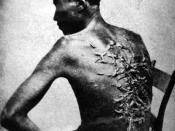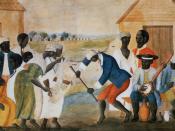Slaves in the Cape were generally a diverse group, and, due to the nature of the farms where they lived, were dispersed over a large area. The divisions among the slave community, such as origin, language and internal hierarchies and fear of punishment meant that slaves did not successfully revolt against their owners.
Many historians have reported that Cape slaves were badly treated. Brutal descriptions of the way in which slaves were punished following their attempts at running away abound. "Individual slaves ran away from the harsh conditions on the farms and lived as fugitives. Most of them were caught: they were flogged, branded and sentenced to hard labour in chains".
This brutal treatment was in part, used to deter slaves from rebellion. Slaves were beaten often, as a constant reminder of what would be the result of a rebellion. If a slave attacked his owners, he would be brutally treated.
Many slave owners were very nervous and very aware of the fact that they were outnumbered by the slaves, and so would assert their dominance by repeated beating and whipping of their slaves.
Due to the unpleasant conditions under which the slaves lived, spontaneous rebellion, born from frustration was the most common occurrence. Constant harsh treatment would spark a reaction to a particular situation, but this was not a widespread one, and there was little organization with regard a full-scale revolt.
Although many of the slaves were concentrated in and around the Cape, many of them from this area were better treated than those from further away. (So were less inclined to want to revolt). Slaves from the agricultural regions inland were treated worse in general, they were isolated, and were unable to organize a revolt.
The slaves were a diverse group of people, from several different countries.


